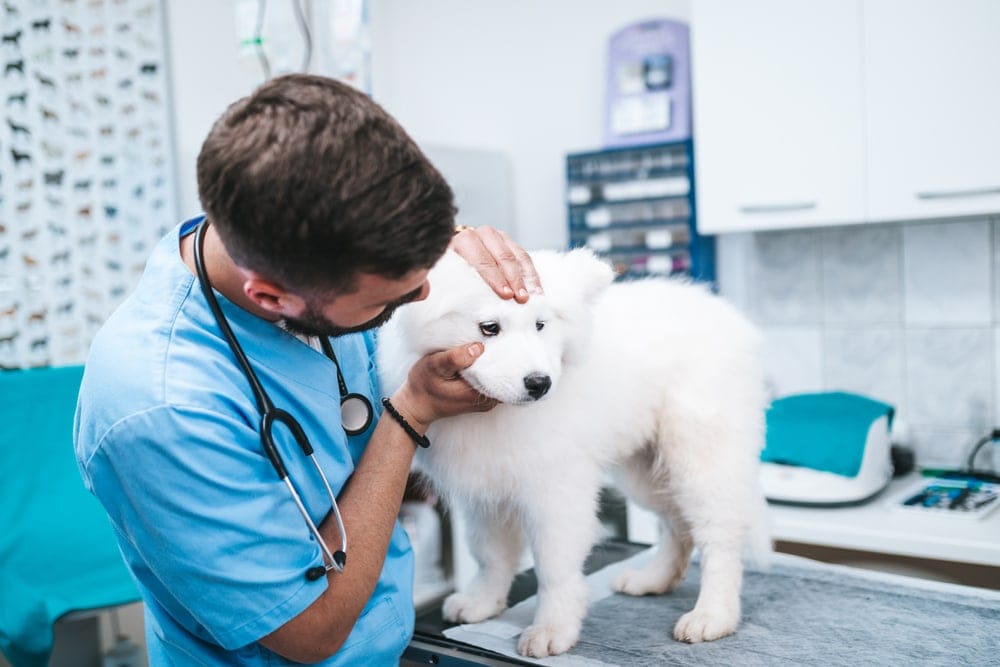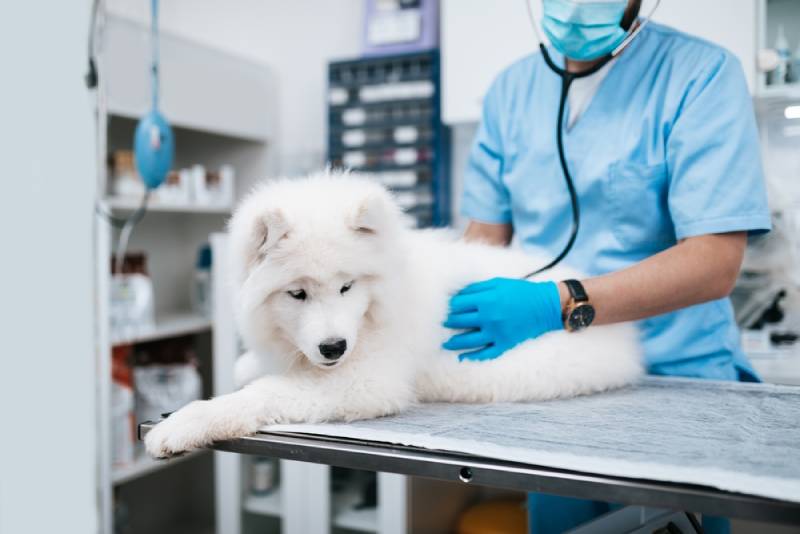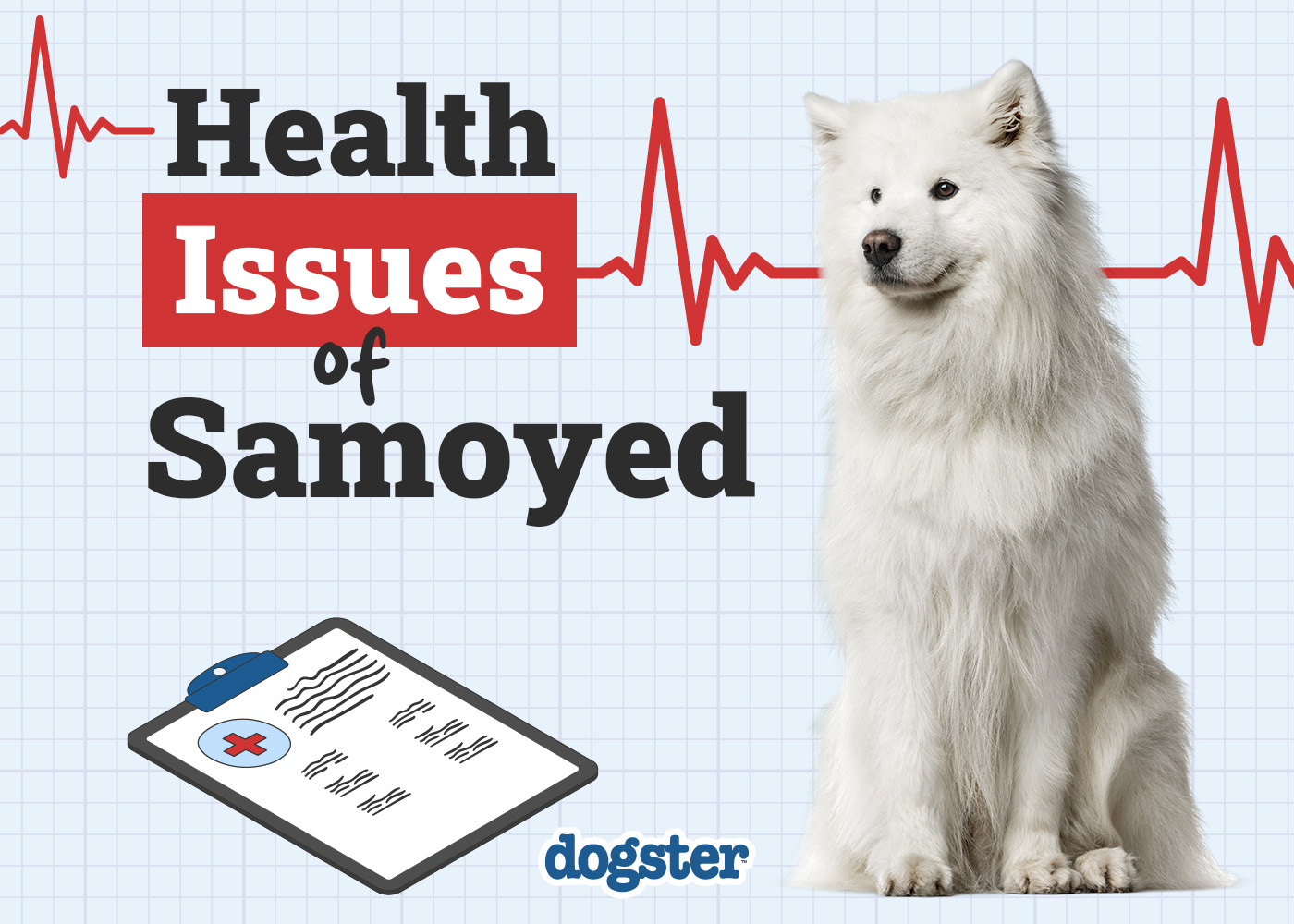Samoyeds are a popular dog breed due to their adorable appearance and vibrant personality. These dogs love to spend time around humans and other animals, making them excellent companions for all kinds of people.
Samoyeds are generally considered a healthy breed with a long lifespan of 12–14 years, if not longer. However, there are still several health issues that this breed can experience.
This article provides you with a list of the most common Samoyed health issues that you should know about. Keep them in mind before choosing a Samoyed as your new family member.
 The 7 Samoyed Health Issues
The 7 Samoyed Health Issues
1. Uveodermatologic Syndrome
A common health problem in Samoyeds is uveodermatologic syndrome (UDS). This issue is characterized by eye inflammation, skin depigmentation, and hair whitening. In severe cases, Samoyeds with this problem can experience various ophthalmological disorders that could eventually lead to blindness.
- Red/cloudy eyes
- Tearing
- Localized vitiligo (mainly on the nose, lips, and eye rims)
- Retinal detachment
- Cataracts
- Glaucoma
- Blindness
This health issue in Samoyeds is treatable, but the affected dog will likely need lifelong therapy to maintain their health, and early intervention is vital for a good outcome.

2. Eye Problems
In addition to UDS, Samoyeds are prone to various eye problems that can cause severe damage, some of which are not treatable.
Retinal Dysplasia
Retinal dysplasia in Samoyeds is mostly due to genetic disorders, which is why these dogs require DNA screenings. This health problem occurs when your Samoyed’s retina, located at the back of the eye, forms abnormal folds, eventually leading to impaired vision and blindness. Unfortunately, there’s no specific treatment for this issue. Some dogs can undergo gene therapy, but the outcome may not be successful.
Progressive Retinal Atrophy (PRA)
This disorder causes the photoreceptors inside the dog’s retina to die, eventually leading to blindness. PRA is not treatable, so all dogs suffering from it will become blind at one point in their life. However, there’s also a DNA screening for this disorder that reduces the chances of newborn Samoyed puppies developing it.
Cataracts
Samoyeds are prone to developing several different types of cataracts, including posterior punctate and juvenile cataracts. A few of these problems are inherited, while older Samoyeds are at risk of developing age-related cataracts.
The treatment for cataracts in Samoyeds depends on the type that a dog has; some can be easily treated, while others might not have a cure.
Distichiasis
Samoyeds with distichiasis have eyelashes that grow from the ducts inside the eyelid, which is unusual. In some situations, these hairs irritate your Samoyed’s eyes; in others, they won’t cause any harm and can even go unnoticed.
Seek veterinary advice if you’re concerned about your pet’s well-being.
If you need to speak with a vet but can't get to one, head over to PangoVet. It's our online service where you can talk to a vet online and get the advice you need for your pet — all at an affordable price!
3. Heart Problems
Samoyeds can experience various heart problems and abnormalities due to genetics.
Aortic Stenosis
Aortic stenosis is a congenital condition that can affect Samoyeds. The issue is present at birth, and due to abnormalities, the dog’s heart needs to work much harder than usual to provide a blood supply to the body.
This health issue could eventually lead to death, so prompt treatment is important. The actual treatment method can vary based on the severity of the issue. Some Samoyeds may need medications, while others may require surgery.
Pulmonic Valve Stenosis
Pulmonic valve stenosis is another congenital condition. Three different types of this issue can affect dogs, but all of them can eventually lead to heart failure. The treatment options vary based on the severity of the issue, but most Samoyeds suffering from pulmonic valve stenosis require cardiac catheterization to open up the narrowed valve.

4. Hip/Elbow Dysplasia
Samoyeds can suffer from hip and elbow dysplasia, which can be passed on to their offspring. Therefore, these dogs require screening for both of these health issues.
- Hip dysplasia: This problem occurs in many medium and large dog breeds, including Samoyeds. Hip dysplasia is when the ball and socket joint of the hip has not formed correctly, leading to abnormal movement and wear of the joint, lameness, and arthritis. In many cases, surgery is necessary to resolve the problem and relieve your dog’s pain.
- Elbow dysplasia: This is a common orthopedic issue in Samoyeds. Similar to hip dysplasia, elbow dysplasia results from incorrect growth and development of the joint, but different components of the elbow may be affected. Depending on the type and severity, elbow dysplasia may require medication or surgical treatment.
Responsible breeders of dogs that are predisposed to hip and elbow dysplasia will have their dogs scored before breeding to try to ensure that only healthy individuals are contributing to future generations. The Canine Health Information Center organizes this, and many other health programs for breeders and pet owners.

5. Samoyed Hereditary Glomerulopathy
A genetic defect that can occur in this breed is the Samoyed hereditary glomerulopathy. This condition is passed from mothers to their male puppies, and it can be deadly.
- Excessive thirst
- Excessive urination
- Poor appetite
- Vomiting
- Lethargy
- Anemia
This genetic condition has no cure, meaning that it’s vital to screen Samoyed mothers and ensure that they don’t carry this gene. Fortunately, DNA testing is relatively inexpensive, so all responsible breeders should be able to show evidence of the test results.

6. Diabetes Mellitus
It’s common for middle-aged Samoyeds to experience diabetes mellitus. This issue can occur in dogs for several reasons, though in Samoyeds, it’s mainly related to having chronic pancreas inflammation.
- Increased urination
- Increased appetite
- Vomiting
- Weight loss
- Dehydration
- Infections
- Poor coat health
- Seizures
This health issue can’t be cured, but Samoyeds with diabetes can still lead normal lives if they get the needed treatment and adapt their lifestyles to their condition.
7. Hypothyroidism
Hypothyroidism is a condition that affects the thyroid gland and causes it to produce abnormal hormone levels. These hormones affect various parts of your dog’s body, including hair growth, weight regulation, and reproduction. Therefore, Samoyeds suffering from hypothyroidism are prone to being infertile, losing hair, and gaining weight.
Depending on the severity of the issue, most dogs will require daily thyroid supplementation to stay in good shape.


Conclusion
There are several different health issues that Samoyeds could experience. However, the Samoyed is still considered a healthy dog breed, as many of these conditions are not life-threatening, and can be managed. Through genetic testing and other screening modalities, the incidence of many of these health issues can be reduced with responsible breeding.
See Also:
- How Much Exercise Do Samoyeds Need? Vet-Approved Care Facts
- American Foxhound Lab Mix: Info, Pictures, Care, & Facts
Featured Image Credit: Pixel-Shot, Shutterstock


 The 7 Samoyed Health Issues
The 7 Samoyed Health Issues
















